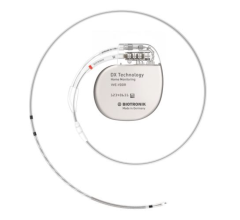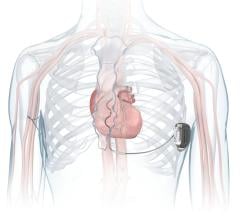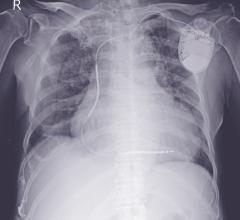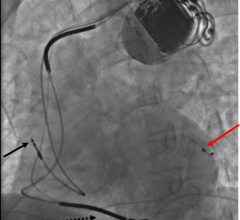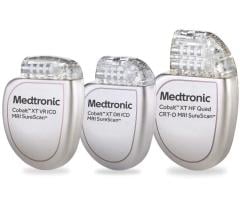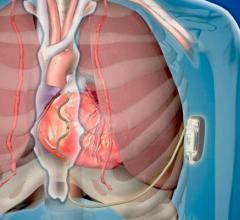May 16, 2013 — New data from 100,438 patients with Boston Scientific implantable cardioverter defibrillators (ICDs) and cardiac resynchronization therapy defibrillators (CRT-Ds) followed in the Latitude Patient Management System demonstrate the battery life of Boston Scientific single-chamber ICDs, dual-chamber ICDs and CRT-Ds are projected to last an average of 13.2, 11.5 and 9.2 years, respectively.[1]
"Clinical studies show early device replacement brings an increased risk of infection and complications,[2, 3, 4, 5, 6, 7]" said Joe Fitzgerald, president, cardiac rhythm management, Boston Scientific. "A nine-year average projected longevity of our CRT-Ds reflects our commitment to quality and engineering excellence. Our advances in device longevity also help reduce healthcare costs through fewer replacement surgeries due to battery depletion."
Introduced in 2008, the Boston Scientific current devices are the world's thinnest ICDs and CRT-Ds, with nearly twice the industry-standard battery capacity. In addition, the Boston Scientific Incepta CRT-D and Energen ICD offer the industry's longest warranty, lasting up to 10 years for some models.[8]
"While device longevity is vital to customers and patients, we believe reliability is equally important," said Kenneth Stein, M.D., chief medical officer, cardiac rhythm management, Boston Scientific. "We have paired our long-lasting ICDs and CRT-Ds with the Relience defibrillator lead, which was designed to address the common issues facing ICD leads. The reliability of the Boston Scientific Endotak Relience defibrillator lead family is unmatched in the industry."
The Endotak Relience family of leads has nearly 20 years of proven performance. The family of leads has a 98.5 percent survival probability at 10 years[9] which is better than the five-year or less survival probability of commonly used competitors' leads[10],[11]. The reliability has been its integrated bipolar design, abrasion-resistant silicone insulation and the unique Gore ePTFE coating that only Boston Scientific offers to patients and their physicians.
"The longer we can keep patients out of the hospital the better," added Stein. "The combination of industry-leading device longevity coupled with lead reliability provides a tangible benefit to patients. This is yet another example of our commitment to meaningful innovation and providing solutions that improve patient quality of life."
For more information: www.bostonscientific.com
References:
1. Based on Boston Scientific LATITUDE data on file.
2. Borleff C J, Thijssen J, Mihaly K, van Ress JB, van Erven L, et al. PACE 2010; 33:1013-1019.
3. Ramachandra. “Impact of ICD Battery Longevity on Need for Device Replacements.” PACE 2010; 33:314–319.
4. Tarakji, Khaldoun G. et al. “CIED Infections: Presentation, Management and Patient Outcomes.” Heart Rhythm Aug 2010; 7:1043-1047.
5. Lekkerkerker, J.C. et al. Risk Factors And Time Delay Associated With Cardiac Device Infections. HEART 2009; 95:715-720.
6. de Bie, MK. et al. Heart Rhythm 2012; 9:494-498.
7. Sohail MR, et al. “Mortality and Cost Associated with Cardiovascular Implantable Electronic Device Infections.” Arch Intern Med 2011; 171:1821-1828.
8. Boston Scientific Limited Warranty for Implantable Cardiac Pulse Generators. 358871-001 ML. Accessed 5/3/2013.
9. Boston Scientific PPR Q4 2012. “Analysis uses only models with PPR-reported survival probabilities.”
10. 6947 Sprint Quattro Secure survival probability is 98.2 percent at five years. Medtronic PPR 2013 First Edition – Issue 68.
11. Durata DF4 Models 7120Q and 7121Q survival probability 98.35 percent at 35 months per Actively Monitored Study Data. St. Jude Medical 2012 PPR 2nd Edition.


 January 13, 2026
January 13, 2026 


